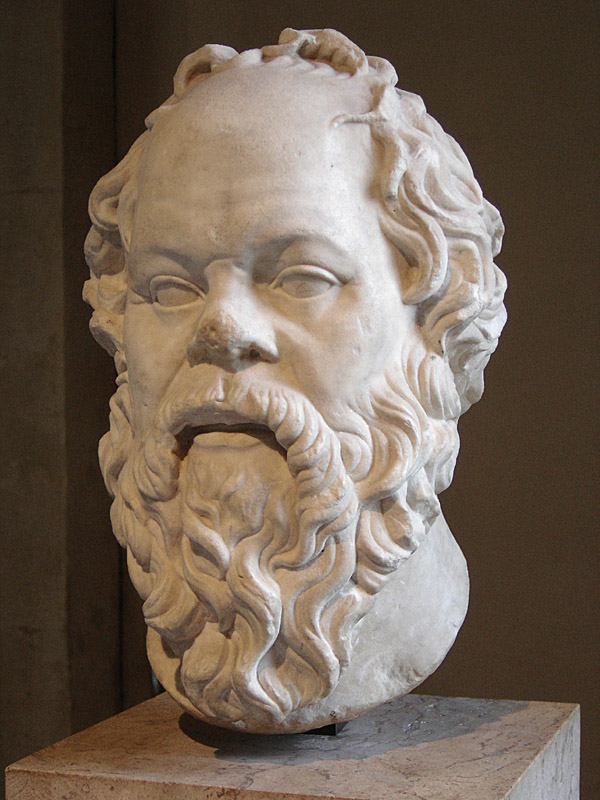 |
Craig White's Literature Courses Critical Sources
Notes to Nietzsche, The Birth of Tragedy
Chapter 12 |
 Socrates (bust), the Louvre |
[Instructor's notes: start with Dionysiac / Apolline (exemplified by tragedies of Aeschylus & Sophocles)
> with Euripides, dialectic becomes Dionysian / Socratic (Classical Greek Poets & Philosophers)
Dionysian chorus as primitive myth; abandonment to conditions, instinct
Review chapter 11:
55 Euripides brought
the spectator on stage
58
two
spectators as sole judges and masters competent to judge
One = Euripides himself as thinker: richness of critical talent
59 > 2nd spectator who did not understand tragedy and therefore chose to ignore it
Chapter 12
59 name for 2nd
spectator? >
Contradictory and
incommensurable elements of Aeschylean tragedy
Duality of chorus
and tragic hero = Apolline & Dionysiac
intention
of Euripides:
excision of primitive and powerful Dionysiac, rebuilding of tragedy on non-Dionysian
60
Dionysus bewitches intelligent adversary: e.g., Pentheus in
Bacchae
Cadmus and
Tiresias (and Euripides): the reasoning of the cleverest individual cannot overthrow ancient
popular traditions
[Euripides’s]
tragedy is a protest against the fulfillment of his intentions
Dionysus hounded
from stage by a daemonic power that spoke through Euripides
Euripides merely a mask: deity that
spoke was a new-born daemon named
Socrates
New opposition:
Dionysiac and Socratic
Conflict >
downfall of Greek tragedy
Socratic intention
vanquished Aeschylean tragedy
[from glossary: 60 the Socratic intention: Nietzsche argues that Socrates, founder of Western philosophy, believes that intellectual analysis generates and disseminates goodness in the leadership and citizenry, and that . . .
Euripides’s tragedies imitate this process when their protagonists explicate and defend their motivations in a context of rational humanistic comprehension and an everyday world they share with the average citizen.
In contrast, according to Nietzsche, the earlier Greek tragedians
(Aeschylus and Sophocles) did not rely on a rationally enlightened world but
brought spectators into contact with a deeper, irrational, ecstatic existence
embodied in myth and mystery (or, following Dionysus, intoxication or altered
mental states).
61 > a
dramatized epic:
an Apolline sphere of art in which
tragic
effects were impossible.
Power of Apolline
epic: entirely illusion and delight and redemption in illusion
Internal dreaming;
therefore never entirely an actor
Euripides draws up
the plan as a Socratic thinker, puts it into effect as a passionate actor
Euripidean tragedy . . . has made the greatest possible break with the Dionysiac elements
needs new stimuli, neither Apolline
or Dionysiac: cool, paradoxical
thoughts
62 Euripides achieves fiery emotions rather than Dionysiac ecstasies
Highly realistic counterfeits, inartistic naturalism
Phenomenon of
aesthetic
Socratism: “to be beautiful everything must
first be intelligible.”
Insistent critical process
Euripidean
prologue: what will happen; therefore no suspense, tension
Pathos rather than plot
A missing link for listener, gap in mesh of preceding story
63 In these
opening scenes Aeschylus and Sophocles employed the subtlest devices to give the
spectator, as if by chance, all the threads that he would need for a complete
understanding; a feature which preserves the noble artistry that masks the
necessary
formal element, making it look accidental.
Euripides’s prologue before exposition via deity: cf. notorious deus ex machina
Anaxagoras / Euripides first sober philosopher / poet in a
company of drunkards
Sophocles on Aeschylus: did right thing but unconsciously
64 Plato: poets cf. soothsayers & oneiromancers
‘everything must be conscious before it can be beautiful”
Socrates = 2nd
spectator who didn’t understand the older tragedy
Socrates = new Orpheus against Dionysus

Euripides